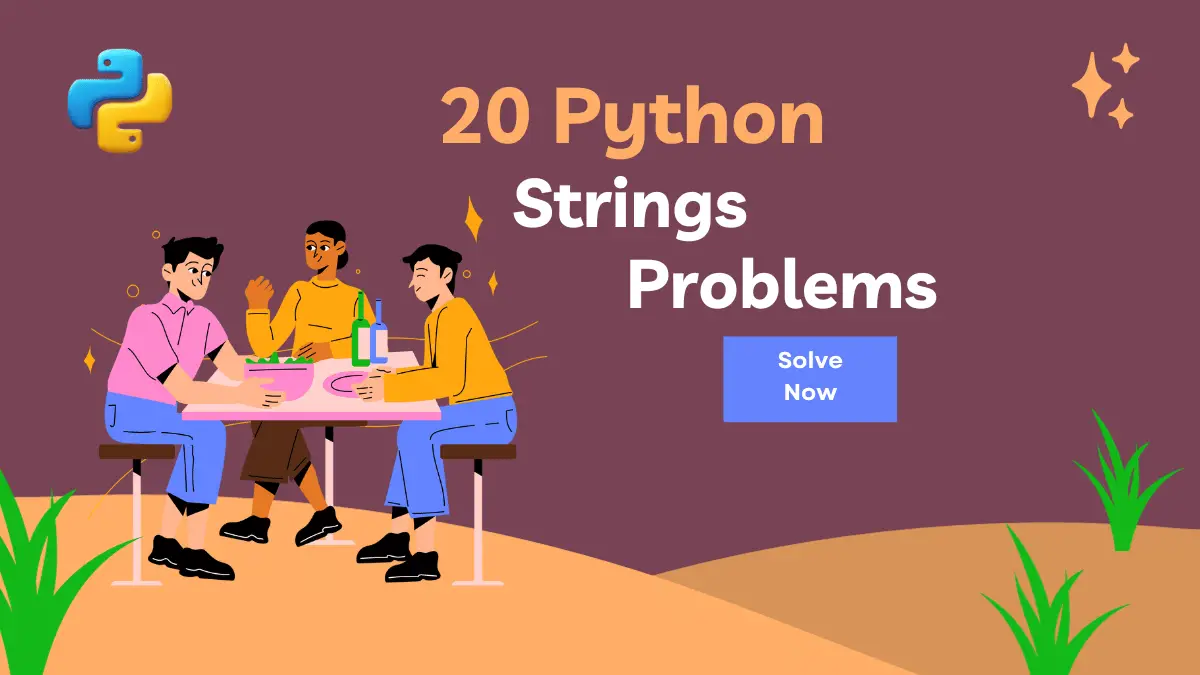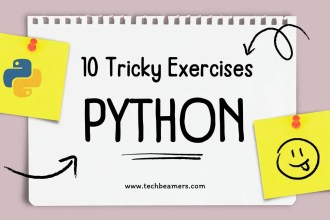Here are 20 real-time problems related to concatenated strings in Python, along with their sample solutions.
How to Concatenate Strings in Python
Each problem revolves around concatenated strings, ranging from the straightforward to the more intricate. This isn’t a lecture; consider it a one-on-one session to enhance your Python skills, tackling string-related issues head-on. Let’s begin and learn how to concatenate strings in Python, step by step.
20 Ways to Concatenate Strings in Python
If you are a beginner and want to know which Python function to use for string concatenation, check this tutorial: String Concatenation in Python
Problem 1
You are given a list of strings. Write a function to find the lexicographically smallest concatenated string.
def smallest_concatenated_string(str_list):
# Your code here
pass
# Example usage:
strings = ["banana", "apple", "cherry", "date"]
result = smallest_concatenated_string(strings)
print(result)Problem 2
Given a list of strings, concatenate them in such a way that the resulting string is a palindrome.
def palindrome_concatenation(str_list):
# Your code here
pass
# Example usage:
strings = ["aba", "cdc", "xy"]
result = palindrome_concatenation(strings)
print(result)Sometimes, you need to make permutations of strings, if you do, then check out: How to Make Permutation of Strings in Python.
Problem 3
Write a function to find the longest common prefix of a list of strings.
def longest_common_prefix(str_list):
# Your code here
pass
# Example usage:
strings = ["apple", "apricot", "apex"]
result = longest_common_prefix(strings)
print(result)Problem 4
Given a list of strings, concatenate them to form the largest possible number.
def largest_number_concatenation(str_list):
# Your code here
pass
# Example usage:
strings = ["54", "546", "548", "60"]
result = largest_number_concatenation(strings)
print(result)Problem 5
Write a function to find the second smallest concatenated string from a list.
def second_smallest_concatenation(str_list):
# Your code here
pass
# Example usage:
strings = ["banana", "apple", "cherry", "date"]
result = second_smallest_concatenation(strings)
print(result)Problem 6
Given a list of strings, find the number of distinct concatenated strings.
def distinct_concatenated_strings(str_list):
# Your code here
pass
# Example usage:
strings = ["abc", "xyz", "abc", "123"]
result = distinct_concatenated_strings(strings)
print(result)While you are busy solving problems with strings, also know how to iterate through strings in Python.
Problem 7
Write a function to check if a string can be formed by concatenating the other two strings.
def can_form_string(s, str_list):
# Your code here
pass
# Example usage:
s = "apple"
strings = ["ap", "ple", "orange"]
result = can_form_string(s, strings)
print(result)Problem 8
Given a list of strings, find the lexicographically smallest and largest concatenated strings.
def smallest_and_largest_concatenation(str_list):
# Your code here
pass
# Example usage:
strings = ["banana", "apple", "cherry", "date"]
result = smallest_and_largest_concatenation(strings)
print(result)Problem 9
Write a function to find the longest concatenated string that is a palindrome.
def longest_palindrome_concatenation(str_list):
# Your code here
pass
# Example usage:
strings = ["aba", "cd", "xy", "ba"]
result = longest_palindrome_concatenation(strings)
print(result)In programming, converting from one data type to another is also a common task you as a programmer should know. So, check this: how to convert strings to integers in Python.
Problem 10
Given a list of strings, concatenate them in a way that maximizes the sum of ASCII values.
def max_ascii_sum_concatenation(str_list):
# Your code here
pass
# Example usage:
strings = ["abc", "def", "xyz"]
result = max_ascii_sum_concatenation(strings)
print(result)Feel free to try solving these problems and let me know if you’d like more explanations or solutions!
Certainly! Here are the concise versions of the problems along with sample solutions:
Problem 11
Find the longest word made of other words in the list.
def longest_word(words):
words.sort(key=len, reverse=True)
for word in words:
if all(word != w and w in word for w in words):
return word
return NoneDo you also like to check how to strip strings in Python? We think you should learn this skill.
Problem 12
Find the minimum number of concatenations required to make a string a palindrome.
def min_concat_for_palindrome(s):
def is_palindrome(string):
return string == string[::-1]
for i in range(len(s)):
if is_palindrome(s[i:]):
return i
return len(s) - 1Problem 13
Find the longest substring that appears in more than one string.
def longest_common_substring(strings):
common_substring = ""
for i in range(len(strings[0])):
for j in range(i + len(common_substring), len(strings[0])):
substring = strings[0][i:j + 1]
if all(substring in s for s in strings[1:]):
common_substring = substring
return common_substringAny string topic is incomplete without talking about multi-line strings. You must once read out from here: Python multiline strings
Problem 14
Check if it’s possible to form a square with four concatenated words.
def can_form_square(words):
words.sort(key=len, reverse=True)
square_side = len(words[0]) // 2
for i in range(len(words)):
if len(words[i]) == square_side:
side1 = words[i]
for j in range(i + 1, len(words)):
side2 = words[j]
remaining_words = [w for w in words if w != side1 and w != side2]
if all(w in remaining_words for w in [side1[:square_side], side2[:square_side]]):
return True
return FalseProblem 15
Find the shortest superstring that contains all strings.
def shortest_superstring(strings):
superstring = strings[0]
while len(strings) > 1:
max_overlap = 0
best_i, best_j = 0, 1
for i in range(len(strings)):
for j in range(i + 1, len(strings)):
for k in range(1, len(strings[i])):
if strings[j].startswith(strings[i][k:]):
if k > max_overlap:
max_overlap = k
best_i, best_j = i, j
strings[best_i] += strings[best_j][max_overlap:]
strings.pop(best_j)
return superstringWhile doing practice, if you feel like reading more in-depth info related to concatenated strings, then check out our tutorial on Python Join().
Problem 16
Find the maximum length of a concatenated string of words with unique characters.
def max_concat_length_unique(words):
def has_unique_chars(string):
return len(set(string)) == len(string)
max_length = 0
for i in range(2 ** len(words)):
current_string = ''.join([words[j] for j in range(len(words)) if (i & (1 << j)) > 0])
if has_unique_chars(current_string):
max_length = max(max_length, len(current_string))
return max_lengthProblem 17
Find the number of distinct palindromes that can be formed by concatenating the strings.
def distinct_palindrome_count(strings):
def is_palindrome(string):
return string == string[::-1]
count = 0
for i in range(len(strings)):
for j in range(i, len(strings)):
concatenated = strings[i] + strings[j]
if is_palindrome(concatenated):
count += 1
return countAnother common coding challenge where you have to write code that runs faster is to slice a string in Python. You should be very careful in picking the best way to avoid any performance issues later.
Problem 18
Find the shortest string that contains all characters of the given strings.
def shortest_string_with_all_chars(strings):
unique_chars = set(''.join(strings))
shortest_string = ''.join(sorted(unique_chars, key=lambda c: strings[0].index(c)))
return shortest_stringProblem 19
Find the longest substring that is common to all strings.
def longest_common_substring_all(strings):
strings.sort()
shortest, longest = strings[0], strings[-1]
for i, char in enumerate(shortest):
if char != longest[i]:
return shortest[:i]
return shortestProblem 20
Check if a string can be formed by concatenating a subsequence of another string.
def can_form_subsequence(s, strings):
def is_subsequence(sub, string):
it = iter(string)
return all(c in it for c in sub)
return any(is_subsequence(s, string) for string in strings)Feel free to ask if you have any questions or need further clarification!
Another crucial task in string handling is splitting strings in Python. Read different ways to split strings in Python.
More Exercises for Practice
In wrapping up, this set of real-world challenges focused on concatenating strings in Python is a valuable tool for enhancing your coding skills. By tackling these problems, you’ve taken significant strides in mastering the intricacies of string manipulation in Python.
Remember, consistent practice is crucial, and solving each problem contributes to your evolution as a Python coder. Keep coding, exploring, and expanding your Python expertise.
Lastly, our site needs your support to remain free. Share this post on social media (Linkedin/Twitter) if you gained some knowledge from this tutorial.
Enjoy coding,
TechBeamers.






